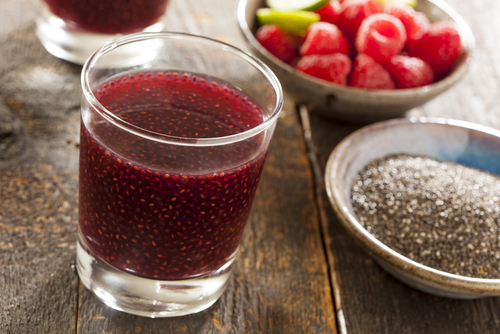Are Chia Seeds Bad For You?
Short answer
Chia seeds contain no unhealthy or non-natural ingredients and include many essential nutrients that can contribute positively to your overall health.
Recommended Alternative
Very healthy and numerous health benefits. A few harmful qualities may be associated, but only under certain circumstances such as an allergic reaction.
View Full Grading System
Category 'A'
Very healthy and numerous health benefits. Side effects are rare. Things rated an 'A+' are typically necessary for survival (for example, water).
Very healthy and numerous health benefits. A few harmful qualities may be associated, but only under certain circumstances such as an allergic reaction.
Very healthy and numerous health benefits. Harmful qualities may be associated, but aren't usually serious.
It is important to note that even the best things in life can become bad in immoderate amounts. So, although something may be rated an 'A+', overconsumption/overdoing can bring unwanted effects.
Category 'B'
Very beneficial to your health. Things rated a 'B+' may have a few harmful qualities to pay attention to.
Overall beneficial to your health. Things rated a 'B' may have some harmful qualities to pay attention to.
More beneficial to your health than not. However, harmful qualities are most likely associated and shouldn't be overlooked.
The main difference between category 'A' and category 'B' is the harmful qualities typically present in 'B' items. Serious side effects are usually uncommon, but are still possible and should be taken note of.
Category 'C'
Both beneficial and harmful qualities associated. Things rated a 'C+' are typically a bit more on the beneficial side. Still, moderation is important.
A fairly even ratio of beneficial and harmful qualities. Moderation is important. Very general topics that can lean towards both sides of the spectrum will be placed here as well. Rice, for example, can be good or bad depending on the type.
More harmful than beneficial. Side effects are common, especially when consumed/done excessively. Moderation is very important.
Category 'C' usually denotes to both good and bad qualities. When it comes to this category, it is important to keep this word in mind: moderation.
Category 'D'
Harmful to your health. Although benefits may be associated, the bad most likely outweighs the good. Moderation is very important.
Harmful to your health. A few benefits may be associated, but the bad outweighs the good. Moderation is extremely important.
Harmful to your health. Very few, if any, benefits are present. Things in this category should be avoided as much as possible.
Category 'D' is typically for things that are more harmful than beneficial. While consuming/doing something unhealthy once in a blue moon shouldn't hurt, we definitely recommend eliminating 'D' items as a regular part of your routine/diet.
Category 'F'
Category 'F' is for things that fail to bring anything beneficial to the table, and are very harmful to your health. We recommend completely avoiding anything in this category. Long-term side effects of 'F' items are usually very serious.
Category 'N'
'N' stands for neutral. Things placed into this category are generally (a) neither good nor bad for you, or (b) lack the necessary evidence to reach any conclusions.
Long answer
Chia seeds are edible herbs from the mint family that resemble tiny sesame seeds and are commonly referred to as 'superfood' due to their supposed aid in weight loss and extreme nutritional value. So are chia seeds really as healthy as they seem?
The short answer to that question is yes. For starters, chia seeds are incredibly natural; they are entirely whole grain and are unprocessed and unrefined. They also contain no gluten and are one hundred percent non-GMO, so it is extremely rare for them to provoke an allergic reaction. These tiny seeds also pack an incredible amount of nutrients into a small one-ounce serving, including eleven grams of fiber, four grams of protein, five grams of Omega-3, as well as a significant amount of antioxidants and a variety of beneficial minerals such as calcium, phosphorous, magnesium, and iron. The nutrients, minerals, and antioxidants contained in a serving of chia seeds can help prevent the development of cancer, contribute to faster and more effective weight loss, increase your energy, strengthen your bones, and decrease your risk of heart disease and type 2 diabetes.
However, like almost any food, there are precautions to take when eating chia seeds. If you decide to regularly incorporate chia seeds into your diet, it is imperative that you stay hydrated. Once you swallow them, chia seeds absorb an extreme amount of water. In fact, they absorb up to 27 times their weight. Although rare, it is possible for the seeds to cause an esophageal / intestinal blockage. In most cases, this is only seen when swallowing chia seeds dry - which is why we recommend mixing your seeds with something else (such as a fresh salad).
All in all, chia seeds are a great addition to your diet. They can help you obtain all of the nutrients you need to stay healthy, have more energy, and help you achieve your weight loss goals.
Possible short-term side effects
- constipation if overconsumed
-
esophageal / intestinal blockage (rare, but possible)
Benefits
- assists weight loss
-
decreases risk of heart disease
-
strengthens bones
-
decreases risk of cancer
-
decreases risk of type 2 diabetes
-
boosts energy
-
great source of fiber
-
great source of antioxidants
-
great source of quality protein
Our Wellness Pick
(what is this?)
Navitas Chia Seeds
- Rich in Omega-3
- High in fiber
- Organic certified
- Antioxidant-rich
- Non-GMO Project verified
Learn More!
Please turn your Ad Blocker off to see this content. Thank you!
Thank you for your feedback!
Written by Shaylie F
Published on: 12-29-2015
Last updated: 12-15-2023
Thank you for your feedback!
Written by Shaylie F
Published on: 12-29-2015
Last updated: 12-15-2023

 Approved by
Approved by 















